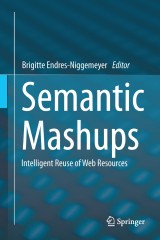Details

Semantic Mashups
Intelligent Reuse of Web Resources|
53,49 € |
|
| Verlag: | Springer |
| Format: | |
| Veröffentl.: | 05.04.2013 |
| ISBN/EAN: | 9783642364037 |
| Sprache: | englisch |
| Anzahl Seiten: | 382 |
Dieses eBook enthält ein Wasserzeichen.
Beschreibungen
<p>Mashups are mostly lightweight Web applications that offer new functionalities by combining, aggregating and transforming resources and services available on the Web. Popular examples include a map in their main offer, for instance for real estate, hotel recommendations, or navigation tools. </p><p> </p><p>Mashups may contain and mix client-side and server-side activity. Obviously, understanding the incoming resources (services, statistical figures, text, videos, etc.) is a precondition for optimally combining them, so that there is always some undercover semantics being used. By using semantic annotations, neutral mashups permute into the branded type of semantic mashups. Further and deeper semantic processing such as reasoning is the next step. </p><p> </p><p>The chapters of this book reflect the diversity of real-life semantic mashups. Two overview chapters take the reader to the environments where mashups are at home and review the regulations (standards, guidelines etc.) mashups are based on and confronted with. Chapters focusing on DBpedia, search engines and the Web of Things inspect the main Web surroundings of mashups. While mashups upgrading search queries may be nearer to the everyday experience of readers, mashups using DBpedia input and sensor data from the real world lead to important new and therefore less known developments. Finally, the diversity of mashups is tracked through a few application areas: mathematical knowledge, speech, crisis and disaster management, recommendations (for games), inner-city information, and tourism.</p><p> </p>Participants of the AI Mashup Challenge wrote all the chapters of this book. The authors were writing for their current and future colleagues – researchers and developers all over the Web who integrate mashup functionalities into their thinking and possibly into their applications.
The Mashup Ecosystem.- Mashups live on Standards.- Mashups for web search engines.- DBpedia Mashups.- Mashups for the Web of Things.- Mashups using Mathematical Knowledge.- Speech Mashups.- Mashups for the Emergency Management Domain.- Similarity Mashups for Recommendation.- Urban Mash-ups.- Travel Mashups.
Brigitte Endres-Niggemeyer mainly works in natural language and knowledge processing. Currently she is focusing on IOS development for iPhone and iPad, with specific attention to speech apps. Previously, she did a series of AI-related projects: from an early computerized cataloguing of physics papers (1984 -- 1987) to empirically founded summarization with a cognitive science and qualitative field research background (1989 -- 1998) to web-based knowledge acquisition and presentation for bone marrow transplantation (2000 -- 2006). A highlight in her many years of teaching activities was the development of a German technical writing program (1989 -- 1990). This book is the fruit of the AI Mashup Challenge that she has been running since 2009.
<p>Mashups are mostly lightweight Web applications that offer new functionalities by combining, aggregating and transforming resources and services available on the Web. Popular examples include a map in their main offer, for instance for real estate, hotel recommendations, or navigation tools. </p><p> </p><p>Mashups may contain and mix client-side and server-side activity. Obviously, understanding the incoming resources (services, statistical figures, text, videos, etc.) is a precondition for optimally combining them, so that there is always some undercover semantics being used. By using semantic annotations, neutral mashups permute into the branded type of semantic mashups. Further and deeper semantic processing such as reasoning is the next step. </p><p> </p><p>The chapters of this book reflect the diversity of real-life semantic mashups. Two overview chapters take the reader to the environments where mashups are at home and review the regulations (standards, guidelines etc.) mashups are based on and confronted with. Chapters focusing on DBpedia, search engines and the Web of Things inspect the main Web surroundings of mashups. While mashups upgrading search queries may be nearer to the everyday experience of readers, mashups using DBpedia input and sensor data from the real world lead to important new and therefore less known developments. Finally, the diversity of mashups is tracked through a few application areas: mathematical knowledge, speech, crisis and disaster management, recommendations (for games), inner-city information, and tourism.</p><p> </p>Participants of the AI Mashup Challenge wrote all the chapters of this book. The authors were writing for their current and future colleagues – researchers and developers all over the Web who integrate mashup functionalities into their thinking and possibly into their applications.
<p>Combines theoretical underpinnings with various sample implementations in different application domains</p><p>Presents sample implementations from areas like travel, crisis management, speech processing, mathematics, and more</p><p>Includes descriptions of underlying standards and resources like DBpedia and the Web of Things</p><p>Written by selected participants at the annual AI Mashup Challenge</p><p>Includes supplementary material: sn.pub/extras</p>
Diese Produkte könnten Sie auch interessieren:

Mixed-Signal Layout Generation Concepts

von: Chieh Lin, Arthur H.M. van Roermund, Domine Leenaerts

96,29 €

System-Level Design Techniques for Energy-Efficient Embedded Systems

von: Marcus T. Schmitz, Bashir M. Al-Hashimi, Petru Eles

96,29 €














